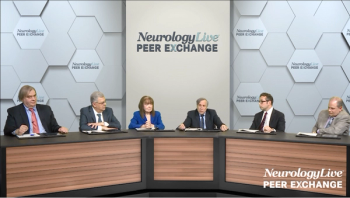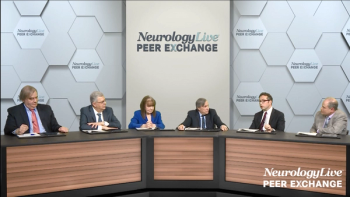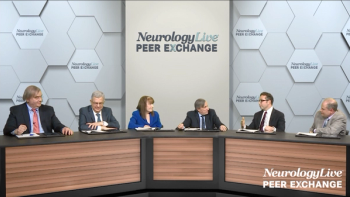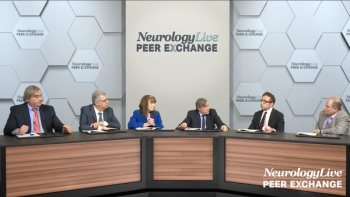
The vice president of US Medical Affairs in Neurology & Immunology at EMD Serono discussed the importance of having long-term and age-matched data on the use of the investigational oral agent in MS.

The vice president of US Medical Affairs in Neurology & Immunology at EMD Serono discussed the importance of having long-term and age-matched data on the use of the investigational oral agent in MS.
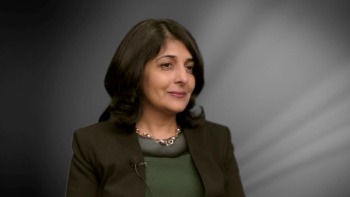
The professor of neurology at Harvard Medical School shared her methods for diagnosing pediatric MS and about the importance of managing the disease in a larger sense.

After showing success in older infants with SMA, risdiplam is now being evaluated in adults—something that’s never been done in a controlled trial of SMA.

The patient has a history of migraine. Is this another attack-or is something else going on?

The 23rd FDA commissioner’s resignation is effective in about a month; his successor has not yet been named.

If approved, galcanezumab would be the first preventive option approved for patients with episodic cluster headache in the United States.

The director of the probabilistic vision group and medical imaging lab at McGill University spoke about machine learning’s potential to help physicians predict MS disease progression, treatment effectiveness, and more.

The director of the Partners Multiple Sclerosis Center at Brigham and Women's Hospital spoke about the future of multiple sclerosis.

The spinal cord area has shown a strong link to MS disability and can help discriminate progressive and relapsing-remitting disease subtypes, which in turn could help inform individualized treatment plans.

The professor of neurology spoke about the challenges faced by MS specialists as their numbers dwindle and the number of patients surpasses 1 million in the United States.

A driver sees what appear to be squiggly lines in the right field of vision of her right eye.

The staff neurologist at the Mellen Center for MS at Cleveland Clinic discussed this challenge with misdiagnosis and how it impacts the clinicians who are treating these patients.

A pair of poster presentations regarding the use of cladribine in multiple sclerosis have shown that No Evidence of Disease Activity-3 status can be sustained up to 4 years, without any new safety signals appearing.

Data have suggested that neurologists treating MS have clearly and persistently deviated from the readily available evidence regarding DMT use, all while costs continue to rise and payers intensify efforts to control them.

A late-breaking poster has suggested that the use of disease-modifying therapy is safe in patients with MS over the age of 65, as well as that disability burden and relapse rates may be lower than believed.

The professor of medicine and community health sciences at the University of Manitoba spoke about the effects of comorbidity on diagnosis, outcomes, and treatment in multiple sclerosis.

The professor of neurology at Harvard Medical School provided some insight into her experience with treating pediatric patients with MS.

Despite being labeled as rare diseases, a number of neurologic conditions impact more patients than most would believe. The consultant with expertise in ophthalmology, gene therapy, and rare and orphan diseases, chimed in about how these diseases can often be overlooked.
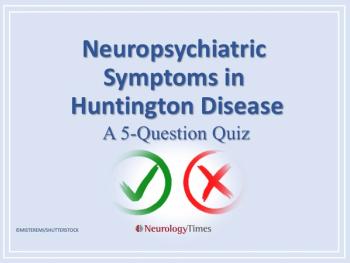
Are you up-to-date on recent guidelines for the management of agitation, anxiety, apathy, psychosis, and sleep disorders in patients with Huntington disease? Take this brief quiz to find out.

The new clinical practice guideline provides 9 recommendations, 4 of which are strongly recommended, for PAP treatment of OSA and is intended for use in conjunction with other AASM guidelines.

The pediatric critical care medicine attending physician in the Department of Anesthesiology and Critical Care Medicine at the Children’s Hospital of Philadelphia spoke about how physicians can better address brain death in pediatric patients.

Investigators concluded that the findings are suggestive of a link between faster cognitive decline, especially frontal lobe dysfunction, in patients with Parkinson who develop levodopa-induced dyskinesia.

A simple screening test may help identify those at risk.

The PDUFA date for the novel oral fumarate has been set for the fourth quarter of 2019. If approved, Biogen plans to commercialize the product under the trade name Vumerity.

The investigators wrote that these findings are suggestive of a superior effect of natalizumab and rituximab compared with fingolimod in suppressing further disease activity in patients with RRMS who switched from interferon or glatiramer acetate due to breakthrough disease.
